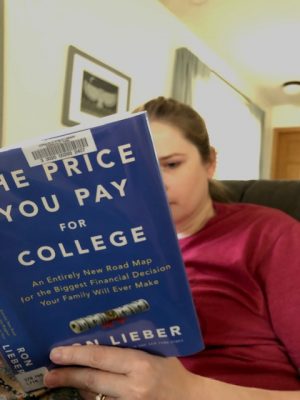FAFSA set to make changes for the upcoming 2022-2023 school year
For West High students graduating next school year, FAFSA has changed it’s aid paperwork.
Former Columns Editor Lucy Polyak ponders the changes to the FAFSA paperwork. (File photo)
November 8, 2021
For those who are graduating in the 2022-2023 school year, Free Application for Federal Student Aid, better known as FAFSA, has announced that there will be some changes to the way that your answers to some application questions will be interpreted.
FAFSA is a government and college aid system meant to make college more accessible. Anyone, no matter their financial status, can fill out the application and questionnaire that goes along with it. Colleges and universities use this application to determine eligibility for federal, state, and college-sponsored financial aid, including grants, educational loans, and work-study programs.
Two questions that previously would have disqualified students from receiving aid- a question about drug convictions and a question about registering with the Selective Service (military draft)- will no longer carry the same weight as they once did. In the past, students who were receiving financial aid and then received a drug conviction would lose their eligibility for aid. Male students 18 and older who said that they had not registered for the draft were also disqualified from receiving aid. These two questions will still remain on FAFSA’s form, but will no longer affect anyone’s ability to receive financial aid.
Any unemployment benefits received due to the COVID-19 pandemic may also have an effect on the amount of aid a student receives. Families who filed their taxes before the unemployment compensation exclusion (UCE) act, which was a program that allowed up to 10,200 dollars of unemployment compensation to be excluded from taxes, received more money in their tax refunds. Without the UCE tax credit stated on their tax forms, their income would be overcompensated. As a result, they would qualify for a smaller amount of aid. Russ Johnson, career coordinator for high schools in the area, gave his opinion on whether COVID-19 will affect aid.
“I don’t think the unemployment aid given out the past few years will have a negative impact on the amount of Pell Grant awarded. In fact, the effects of Covid-19 could help some students. Last year, colleges were able to give out additional funds to students greatly affected by COVID. Hopefully these extra funds will be available again this year,” Johnson said.
It is recommended that all families who are worried about the effect of COVID-19 unemployment benefits wait for further guidance before filling out FAFSA forms. As long as the schools they are applying for aren’t supplying aid on a first come, first serve system.









